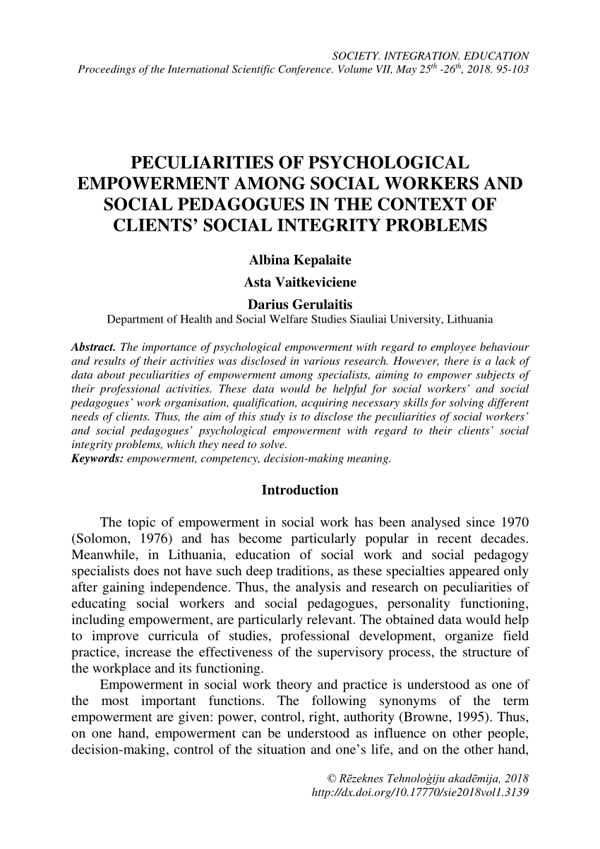Table of Contents:
- Introduction
- Definition of Psychological Empowerment
- Importance for Social Workers
- Benefits of Psychological Empowerment
- Implementation Strategies
- Challenges Faced
- Conclusion
Introduction
Psychological empowerment plays a crucial role in the success and well-being of social workers. In this article, we will explore the concept of psychological empowerment and its significance for social work professionals.
Definition of Psychological Empowerment
Psychological empowerment refers to the process of enhancing an individual's sense of control, autonomy, and self-efficacy. It involves empowering individuals to take charge of their own lives and make meaningful choices.
Definition of Psychological Empowerment
Psychological empowerment refers to the feeling of being in control of one's own life and being able to make decisions that affect one's well-being. In the context of social work, psychological empowerment is about helping individuals and communities to gain the skills, confidence, and resources needed to advocate for themselves and make positive changes in their lives.
Social workers play a crucial role in empowering their clients by providing support, guidance, and resources to help them overcome challenges and improve their well-being. By promoting psychological empowerment, social workers help individuals build self-esteem, self-efficacy, and a sense of control over their lives.
Ultimately, psychological empowerment is about helping individuals realize their own strengths and potential, so they can lead fulfilling and meaningful lives.

Importance for Social Workers
For social workers, psychological empowerment is essential in building confidence, resilience, and a sense of purpose. It enables them to better support and advocate for their clients, leading to improved outcomes.
Social workers play a crucial role in empowering individuals and communities, particularly in terms of psychological empowerment. By providing support, resources, and guidance, social workers help individuals build confidence, self-esteem, and a sense of control over their lives. This can lead to improved mental health, better decision-making, and increased overall well-being.
Social workers also work to address systemic barriers and injustices that may be preventing individuals from achieving their full potential. By advocating focused social psychological strategies promoting social justice, social workers empower individuals to advocate for themselves and their communities.
In essence, social workers are key agents in fostering psychological empowerment, which is essential for individuals to thrive and lead fulfilling lives. Their work is invaluable in creating a more equitable and inclusive society for all.

Benefits of Psychological Empowerment
The benefits of psychological empowerment for social workers include increased job satisfaction, reduced burnout, and improved client engagement. It also enhances problem-solving skills and promotes a sense of collaboration within teams.
Psychological empowerment is crucial for social workers as it helps them develop a sense of confidence, autonomy, and self-efficacy in their roles. Here are some key benefits of psychological empowerment for social workers:
- Increased job satisfaction and motivation
- Enhanced ability to handle stress and challenging situations
- Improved communication and collaboration with clients and colleagues
- Greater job performance and productivity
- Better overall well-being and mental health
By empowering themselves psychologically, social workers are better equipped to make a positive impact in the lives of their clients and communities. It is important for social workers to prioritize their own mental and emotional well-being in order to effectively support others.

Implementation Strategies
Implementing psychological empowerment in social work practice requires creating a supportive work environment, providing opportunities for professional development, and fostering open communication channels. It also involves encouraging self-reflection and personal growth.
Social workers play a crucial role in empowering individuals and communities to overcome challenges and improve their well-being. Psychological empowerment is an important aspect of this process, as it involves enhancing individuals' sense of control, competence, and confidence in their abilities.
There are several strategies that social workers can use to implement psychological empowerment effectively:
- Building trusting relationships: Establishing a strong and trusting relationship with clients is essential for fostering psychological empowerment. Social workers should strive to create a safe and supportive environment where clients feel comfortable expressing their thoughts and feelings.
- Setting achievable goals: Helping clients set realistic and achievable goals can boost their confidence and motivation. Social workers should work collaboratively with clients to identify their strengths and abilities and develop a plan to achieve their goals.
- Providing support and encouragement: Social workers should provide emotional support and encouragement to clients as they work towards their goals. Recognizing and celebrating small successes can help clients build confidence and belief in their abilities.
- Teaching problem-solving skills: Equipping clients with problem-solving skills can empower them to overcome obstacles and challenges on their own. Social workers can teach clients strategies for identifying and addressing problems effectively.
- Promoting self-care and self-compassion: Encouraging clients to practice self-care and self-compassion is essential for fostering psychological empowerment. Social workers should help clients develop healthy coping mechanisms and practice self-compassion in the face of setbacks.
By implementing these strategies, social workers can help empower individuals and communities to take control of their lives, build confidence in their abilities, and achieve their goals.

Challenges Faced
Despite its benefits, psychological empowerment can present challenges for social workers, such as navigating power dynamics, addressing systemic barriers, and managing conflicting priorities. It requires ongoing effort and support from organizations.
Social workers play a crucial role in empowering individuals and communities to lead fulfilling lives. However, they also face numerous challenges in their quest to provide psychological empowerment to those in need.
1. Burnout and Compassion Fatigue
Social workers often work with clients who have experienced trauma or are facing challenging life circumstances. This can lead to burnout and compassion fatigue, as they are constantly exposed to the emotional pain of others.
2. Limited Resources
Social workers may face limited resources, such as funding and access to mental health services, which can hinder their ability to provide adequate support to their clients.
3. Vicarious Trauma
Being exposed to the trauma of their clients can result in vicarious trauma for social workers, impacting their mental and emotional well-being.
4. Role Strain
Social workers often juggle multiple roles and responsibilities, which can lead to role strain and feelings of being overwhelmed.
5. Stigma and Discrimination
Social workers may face stigma and discrimination from clients, colleagues, and the broader society, which can affect their ability to effectively empower those in need.
In order to address these challenges, it is important for organizations and institutions to provide support and resources for social workers, as well as implement strategies to promote self-care and well-being within the profession.

Conclusion
In conclusion, psychological empowerment is a powerful tool for social workers to enhance their effectiveness and well-being. By prioritizing empowerment, social work professionals can create positive change and make a lasting impact on individuals and communities.
Key Takeaways:
- Psychological empowerment is crucial for social workers in building confidence and resilience.
- Implementing empowerment strategies can lead to improved job satisfaction and client outcomes.
- Challenges such as power dynamics and systemic barriers must be addressed in the process of empowerment.
FAQ:
Q: How can social workers promote psychological empowerment in their practice?
A: Social workers can promote psychological empowerment by building strong relationships with clients, fostering a sense of autonomy and choice, and advocating for their clients' rights.



Recent Comments